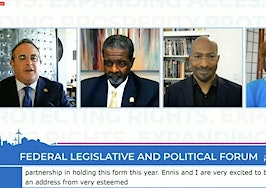Following a debate over privacy and pocket listings, the board of directors of the National Association of Realtors on Friday approved a controversial proposal to require listings to include a property address upon submission to a multiple listing service.
The board, which has some 800 members, also approved a policy, originally proposed by Redfin, requiring sold listings (without a sales price) to be included in data feeds in non-disclosure states. (Sold listings are already required to be included in data feeds in every other state.) That policy passed without any discussion, 716 in favor and 44 opposed.
The votes were among the last taken at the board’s meeting on the last day of NAR’s midyear conference, the Realtors Legislative Meetings, which was held virtually and open to both members and the press.
The 1.4-million-member trade group’s Multiple Listing Issues and Policies Committee previously shelved the address proposal at NAR’s annual conference in November following a spirited debate for and against the mandate. After re-consideration by the committee’s MLS Technology and Emerging Issues Advisory Board, the proposal was once again brought forward with added language about including a parcel number or a legal description if an address is not available, though the proposal proved no less controversial at the committee’s meeting last Friday.
The policy says: “Residential listings filed with the MLS must include a property address where one exists at the time the listing is filed. If a property address is unavailable, then the parcel identification number must be submitted at the time the listing is filed. If no address or parcel identification number is available at the time the listing is filed, the listing must, at a minimum, contain a legal description of the property sufficient to describe the location of the property. This information shall be available to participants and subscribers at the time of filing.”
The policy does not require that an address be made public, just that it be immediately available to other MLS subscribers.
“The committee recommends this action to empower MLS participants and subscribers with key listing information, specifically the property address to best serve their clients and customers,” Jon Coile, the committee’s chair, told NAR’s directors upon presenting the proposal.
“It’s important to note that this is about brokers and agents sharing the address with other brokers and agents inside the MLS. The listing broker and seller will still have many options available to withhold the address from public display on the internet to control who gets access to the property and as a last resort to withhold the listing itself from distribution from other MLS participants through office exclusive.”

Joe Coile at the National Association of Realtors’ board of directors meeting, May 14, 2021
He added that the policy “leverages the MLS’s three tenets of cooperation, efficiency and transparency” and would “ensure that listing information in the MLS is complete.”
“Further, this new policy will discourage business practices and fair housing concerns that may not provide property details to all potential qualified purchasers working with another MLS subscriber agent,” Coile said.
The policy is mandatory for Realtor-affiliated MLSs. Diana Bull, an NAR director from Santa Barbara, California, proposed an amendment to the policy that would have allowed MLSs local discretion to grant an exemption to the requirement when the seller has completed an MLS-authorized form at the time the listing is filed indicating the reasons for keeping the address private.

Diana Bull at the National Association of Realtors’ board of directors meeting, May 14, 2021
Asked her rationale, Bull referenced NAR’s contentious Clear Cooperation Policy, which, in a bid to curtail pocket listings, requires listing brokers to submit a listing to their MLS within one business day of marketing a property to the public. She said that when Clear Cooperation became a requirement, her local Realtor association called a meeting of brokerage owners, brokers and managers among the membership, of which 60 or 70 showed up.
“They all expressed the need for privacy and protection of our clients,” Bull said. “They also insisted that all property details such as price, ZIP codes, school districts, and amenities would be transparent.”
Santa Barbara’s MLS ended up instituting a “Privacy” listing status that other MLSs also adopted, according to Bull.
“I personally represented a lady with two little girls,” she said. “Her estranged husband was so hostile, so hostile even towards the attorneys. My lady would want the opportunity as a seller to sign an MLS authorized form and state her reasons why the address needs to be withheld from the MLS.”
In the discussion that followed, nearly all of the directors who spoke opposed the amendment, however. Two directors objected to Bull’s proposal on the grounds that it was too broad and did not specify the reasons that a seller could opt out, such as fear for their safety.
Jeffrey Levine, vice chair of the MLS committee and a director from Boca Raton, Florida, said there were already existing policies in place that allow sellers not to publish addresses through the internet or to the public in general.
“We are in a market where we have many public officials, celebrities, world leaders that own homes [in] some of the highest net worth ZIP codes in the country,” Levine said.
“Those properties are held in trusts, in LLCs, in holding entities that are there in purpose to protect the identity of the actual holder of the property. In the case of domestic violence and other issues, police officers … there are policies in place and procedures in place to have their information kept confidential.”
He added, “This is not a question of privacy, but this is a question of the integrity of the data of the MLS [so] that the participants are able to know and understand where a potential property is located when the listing is put into the system.”
Coile noted that, in a domestic violence case, unless the person ordered to stay away is a Realtor, they won’t have access to the property address. Having a few listings in “Privacy” status is not the issue, he said. “The issue is when it becomes 30 percent of the MLS that withholds the address from our fellow subscribers or fellow agents and brokers,” he said. “If we can’t trust each other, what are we doing?”
Director Christy Gessler, broker-owner in the Austin, Texas area, opposed the amendment because it would “create competition between MLSs with common borders or common areas in an attempt to garner a listing by offering more favorable rules to subscribers in common areas.”
On the other hand, director Greg Kiely of the Cape Cod Islands MLS spoke in favor of the amendment because his MLS competes with a broker-owned MLS and the rule would “put us at a disadvantage when it comes to serving the customers’ wishes.”
“This amendment allows Realtor-owned MLSs to stay competitive and appropriately responsive to the needs of their local markets, which is what I believe we should be doing nationwide,” he said.
Director Rick Harris, a principal broker in Ashland, Oregon, spoke against the amendment, pointing out that brokerages across the country work with several MLSs.
“Having uniform rules about the display of addresses is easier for brokers, it’s more manageable for the consumer, and quite frankly, it gets at the fundamental thing about real estate: location, location, location,” he said.
“If we cannot have a database that properly discloses addresses … to the other participants of the MLS, then we have a database that is less useful, less profitable for the brokerage and less friendly to the consumer.
“This is both a fair housing issue, and as Diana rightly says, an opportunity to think about how to protect the consumer where needed, and that is why there are additional rules already in place for the consumer to opt out of internet display of their address. Adding this amendment makes it much more difficult to have the level of database that brokerages, their agents, and ultimately, the consumer wants to have.”
Director Scott Gieser of Riverside, California, indicated he thought “privacy” was being used as a code word for “pocket,” as in pocket listings, which is why the Clear Cooperation Policy was instituted.
“So if everyone here would take the word ‘privacy’ out and add the word ‘pocket’ that would actually kind of clarify things,” he said.

Scott Gieser at the National Association of Realtors’ board of directors meeting, May 14, 2021
“There’s no real reason for a pocket listing that’s valid,” he continued. “There are going to be extreme exceptions, like Diana’s instance of the estranged husband. That could be such a very small percentage of what’s going on in our MLSs [that] to regulate and legislate our rules based on [that], to have the future being abused because of that one [case], would be a travesty.”
The amendment failed with 235 in favor and 562 opposed. The original motion passed with 665 in favor and 127 opposed.

Charlie Oppler reading the MLS policy vote results at the National Association of Realtors’ board of directors meeting, May 14, 2021
Editor’s note: This story has been updated with comments from the discussion at the board meeting.







